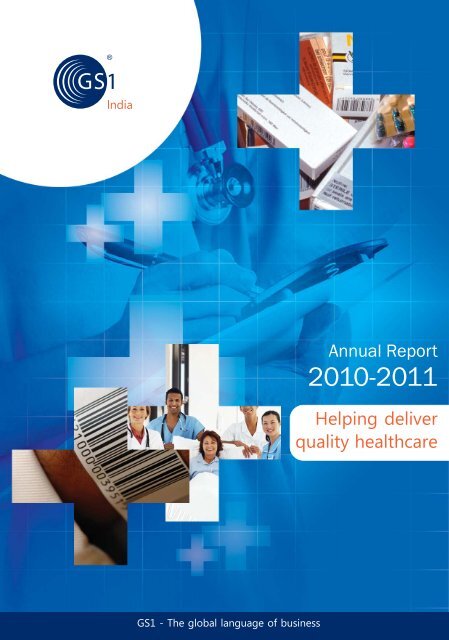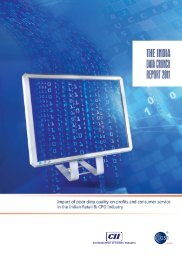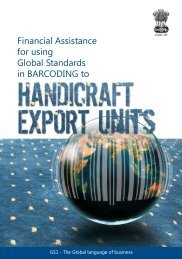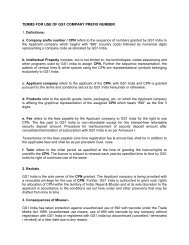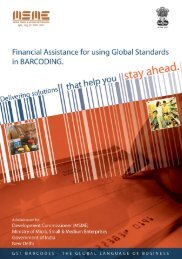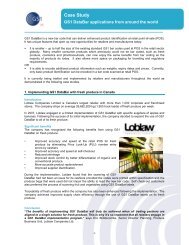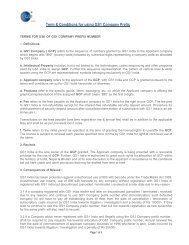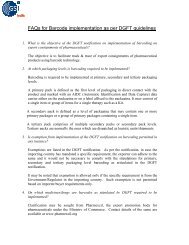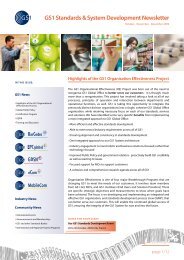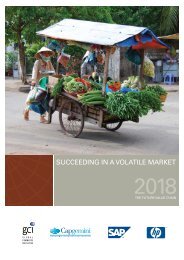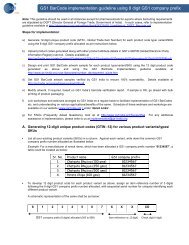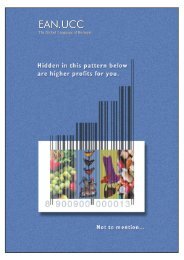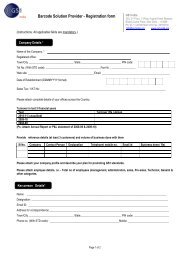Annual Report 2010-11 - GS1 India
Annual Report 2010-11 - GS1 India
Annual Report 2010-11 - GS1 India
You also want an ePaper? Increase the reach of your titles
YUMPU automatically turns print PDFs into web optimized ePapers that Google loves.
<strong>Annual</strong> <strong>Report</strong><br />
<strong>2010</strong>-20<strong>11</strong><br />
Helping deliver<br />
quality healthcare<br />
<strong>GS1</strong> - The global language of business
Driving adoption of global standards through<br />
one vision, one voice, one organisation.<br />
At <strong>GS1</strong>, our vision is a world where<br />
things and related information move<br />
efficiently and securely for the benefit<br />
of businesses and improvement of<br />
peoples’ lives, everyday, everywhere.<br />
Our mission is to be the neutral leader<br />
enabling communities develop and<br />
implement global standards and<br />
providing the tools, trust and<br />
confidence needed to achieve our<br />
vision.
ANNUAL REPORT <strong>2010</strong> - 20<strong>11</strong><br />
Contents<br />
Message from the President .......................... 2<br />
Message from the CEO .................................... 3<br />
Healthcare ............................................................. 8<br />
Retail .................................................................... <strong>11</strong><br />
Food ..................................................................... 14<br />
Transport & Logistics ..................................... 15<br />
Focus Areas ....................................................... 17<br />
Visibility ....................................................... 18<br />
Data Quality ............................................... 20<br />
B2C Initiative .............................................. 21<br />
Sustainability ............................................. 22<br />
Looking Ahead ................................................. 23
Message from the President<br />
I take pleasure in presenting the 13 th <strong>Annual</strong> <strong>Report</strong><br />
of <strong>GS1</strong> <strong>India</strong> for <strong>2010</strong>-<strong>11</strong>.<br />
Despite volatile market conditions during the<br />
year, <strong>GS1</strong> <strong>India</strong> performed well and exceeded<br />
targets set for <strong>2010</strong>-<strong>11</strong>.<br />
With increasing incidence of counterfeit<br />
medicines globally and the need for lowering high<br />
healthcare delivery costs, adoption of technology<br />
and global standards which can help in product<br />
authentication, track & trace and lower<br />
healthcare supply chain costs become essential.<br />
Globally, <strong>GS1</strong> is deeply engaged with healthcare<br />
stakeholders comprising policy makers, Industry<br />
etc in finding solutions to the above problems.<br />
<strong>GS1</strong> <strong>India</strong> has been sensitizing the <strong>India</strong>n<br />
healthcare sector on the above over the past<br />
few years which would now lead to adoption<br />
of <strong>GS1</strong> barcodes from this year onwards, on<br />
pharmaceuticals destined for exports and sold<br />
in the domestic market.<br />
This is a significant development and is<br />
expected to lead to widespread barcode<br />
scanning in the country by pharmacies,<br />
hospitals etc with resultant benefits on ready<br />
stock availability, counterfeit detection, track<br />
& trace, recall and effective supply chain<br />
management of medical supplies.<br />
<strong>GS1</strong> <strong>India</strong> was actively involved in the<br />
development of National standards on Good<br />
Agricultural Practices (<strong>India</strong> GAP). Discussions<br />
were also held with Global G.A.P. Germany on use<br />
of <strong>GS1</strong> standards for unique farm/plot<br />
identification and this is expected to result in use<br />
of the GLN (Global Location Number) for<br />
identification of Globa G.A.P certified farms in<br />
the country.<br />
Under the aegis of the CII National Retail<br />
Committee, <strong>GS1</strong> <strong>India</strong> conceptualized and<br />
undertook a comprehensive study on the quality<br />
of product data in the <strong>India</strong>n Retail sector and its<br />
impact on the topline and bottomline of retailers<br />
and their suppliers.<br />
<strong>GS1</strong> <strong>India</strong> organized and hosted successfully, the<br />
<strong>GS1</strong> Asia Pacific Forum in Oct’10 at New Delhi<br />
which drew 55 participants from <strong>GS1</strong><br />
organisations in 17 countries including Mr.<br />
Miguel Lopera, President & CEO, <strong>GS1</strong> and key GO<br />
staff members.<br />
Shri Ravi Mathur, CEO, <strong>GS1</strong> <strong>India</strong> was awarded<br />
the Retail Icon award for 20<strong>11</strong> by the Asia Retail<br />
Congress in recognition of his contribution to<br />
the retail sector in <strong>India</strong>.<br />
I take this opportunity to thank the Board of<br />
Management for its continued pro-active support<br />
in furthering the objectives of <strong>GS1</strong> <strong>India</strong> and on<br />
its behalf commend the work done by <strong>GS1</strong> <strong>India</strong><br />
Team under the leadership of Shri Ravi Mathur.<br />
Sumanta Chaudhuri<br />
2
ANNUAL REPORT <strong>2010</strong> - 20<strong>11</strong><br />
Message from the CEO<br />
<strong>GS1</strong> <strong>India</strong> reported good overall performance in<br />
<strong>2010</strong>-<strong>11</strong> and exceeded its targets by 200% in<br />
subscriber enrollment and 30% in income<br />
generation.<br />
Delivery of quality and affordable healthcare is<br />
a key global priority, exercising the attention of<br />
Governments, Regulators and healthcare<br />
stakeholders. <strong>GS1</strong> has been working in this space<br />
in response to Industry needs for standards<br />
which help in enhancing efficiency and quality<br />
of healthcare.<br />
The pharma sector is poised to adopt <strong>GS1</strong><br />
standards for domestic supplies with the Ministry<br />
of Health & Family Welfare, Govt. of <strong>India</strong><br />
directing incorporation of <strong>GS1</strong> barcodes for<br />
medical supplies procured by it for Central<br />
Government Hospitals and CGHS health centers.<br />
In a parallel movement aimed at facilitating<br />
product authentication and track & trace of<br />
pharma drugs, all pharma exports were also<br />
mandated to adopt <strong>GS1</strong> standards and barcoding.<br />
Our <strong>Annual</strong> <strong>Report</strong> for <strong>2010</strong>-<strong>11</strong> takes healthcare<br />
as its central theme with the impending<br />
adoption of <strong>GS1</strong> barcodes this year on medical<br />
supplies in <strong>India</strong>.<br />
A Proof of Concept was successfully organized<br />
and concluded by us to demonstrate on how<br />
global data synchronization would work between<br />
retailers and their suppliers. Consequent to it,<br />
there was broad acceptance on moving ahead<br />
with product data synchronization using GDSN<br />
standards developed by <strong>GS1</strong>.<br />
<strong>GS1</strong> <strong>India</strong> conceptualized and guided the data<br />
crunch study conducted through IBM <strong>India</strong>, under<br />
the aegis of the CII National Retail Committee on<br />
prevalent product data quality in <strong>India</strong>.<br />
<strong>GS1</strong> <strong>India</strong> was invited to participate in the<br />
National Technical Working Group under Quality<br />
Council of <strong>India</strong> to draw <strong>India</strong>GAP standards. This<br />
is expected to drive implementation of traceability<br />
in <strong>India</strong>n food supply chains using <strong>GS1</strong> traceability<br />
standards, enhancing food safety and providing<br />
increased market access to <strong>India</strong>n food exports.<br />
<strong>GS1</strong> <strong>India</strong> maintained high level of visibility<br />
through participation as speaker/panelist in<br />
several important national events on retailing,<br />
logistics, food safety, counterfeiting etc.<br />
Concerted efforts were made at engaging the Automatic<br />
Identification Data Capture solution provider<br />
community in driving adoption of data capture<br />
technologies and global standards in Supply Chains.<br />
<strong>GS1</strong> <strong>India</strong> continued to participate and actively<br />
contribute to the deliberations of the <strong>GS1</strong> Advisory<br />
Council. At the <strong>GS1</strong> Global Forum in Feb’<strong>11</strong>, <strong>GS1</strong><br />
<strong>India</strong> participated as speaker/panelist/chairperson<br />
in several key business sessions.<br />
During the year Shri Sumanta Chaudhuri, Joint<br />
Secretary, Department of Commerce, Ministry of<br />
Commerce and Industry, Govt. of <strong>India</strong> took over as<br />
President of <strong>GS1</strong> <strong>India</strong>. We gratefully acknowledge<br />
the services rendered by our previous President,<br />
Shri P. K. Dash and look forward to continued support<br />
and guidance from <strong>GS1</strong> <strong>India</strong>’s Board of<br />
Management under Shri Chaudhuri’s leadership.<br />
A strong base has been created by us for adoption<br />
of <strong>GS1</strong> standards across product categories and<br />
Industry sectors. We expect to leverage this with<br />
innovative approaches to spearhead growth in<br />
the coming years and continue to perform well<br />
as in the previous years.<br />
Ravi Mathur<br />
<strong>GS1</strong> - The global language of business<br />
3
<strong>GS1</strong> is a neutral, not-for-profit organisation that<br />
facilitates collaboration amongst trading partners<br />
and technology providers, in order to solve<br />
together business challenges that leverage<br />
standards and ensure safety, efficiency and<br />
visibility of value chains.<br />
Headquartered at Brussels, Belgium, <strong>GS1</strong> oversees<br />
a global network of <strong>11</strong>0 <strong>GS1</strong> organisations serving<br />
over 150 countries.<br />
<strong>GS1</strong> <strong>India</strong> (earlier EAN <strong>India</strong>), set up in 1996 as a<br />
not-for-profit standards body, is an affiliate of<br />
<strong>GS1</strong>. Its Management Board and founder<br />
members comprise the following:<br />
y<br />
y<br />
y<br />
y<br />
y<br />
y<br />
y<br />
y<br />
y<br />
y<br />
Ministry of Commerce and Industry, Government of <strong>India</strong><br />
Agricultural & Processed Food products Export Development<br />
Authority<br />
Federation of <strong>India</strong>n Chambers of Commerce and Industry<br />
Associated Chambers of Commerce and Industry of <strong>India</strong><br />
Federation of <strong>India</strong>n Export Organisations<br />
Confederation of <strong>India</strong>n Industry<br />
<strong>India</strong>n Institute of Packaging<br />
<strong>India</strong>n Merchants’ Chamber<br />
Bureau of <strong>India</strong>n Standards<br />
Spices Board<br />
<strong>GS1</strong> <strong>India</strong> Management Board is headed by Shri<br />
Sumanta Chaudhuri, Joint Secretary, Ministry of<br />
Commerce and Industry, Govt. of <strong>India</strong> with Shri<br />
Ravi Mathur as its Chief Executive Officer.<br />
In <strong>2010</strong>-<strong>11</strong>, <strong>GS1</strong> <strong>India</strong> completed 15 years<br />
affiliation with <strong>GS1</strong>, in recognition of which it<br />
was presented a plaque by Mr. Timothy Smucker,<br />
Chairman Emeritus and Mr. Miguel Lopera,<br />
President & CEO, <strong>GS1</strong>.<br />
4
ANNUAL REPORT <strong>2010</strong> - 20<strong>11</strong><br />
<strong>GS1</strong> standards and solutions<br />
For the past 35 years, <strong>GS1</strong> is dedicated to the<br />
development and implementation of open,<br />
interoperable and user driven standards used in<br />
Supply Chain Management.<br />
Open standards in general enable interoperability,<br />
flexibility and vendor independence which in turn<br />
result in reduction in end product costs to<br />
businesses and consumers.<br />
<strong>GS1</strong> standards are widely used across over 25<br />
industry sectors which include Retail, Healthcare,<br />
Transport & Logistics, Food etc.<br />
More than one million companies worldwide use<br />
these standards and solutions to improve their<br />
topline and bottomline performance,<br />
meet growing consumer demands and enable<br />
compliance with varied requirements of buyers<br />
and legislations worldwide.<br />
<strong>GS1</strong> standards provide a global language of business<br />
that helps organisations identify, capture and share<br />
information throughout the global value chain in a<br />
uniform, structured, seamless and consistent<br />
manner. This in turn facilitates implementation of<br />
several Supply Chain applications<br />
like traceability, recalls, product authentication,<br />
inventory management, upstream integration etc.<br />
Identify<br />
Share<br />
<strong>GS1</strong> Identifiers provide unique, unambiguous and <strong>GS1</strong> eCom : Standards for electronic business<br />
universal identification of products, assets, service messaging for rapid and accurate data<br />
relationships, locations/entities etc.<br />
transmission between trading partners.<br />
Capture<br />
<strong>GS1</strong> GDSN : Standards which enable synchronisation<br />
<strong>GS1</strong> Barcodes : Standards for encoding <strong>GS1</strong> of master data between trading partners using the<br />
Identifiers in barcodes<br />
Global Data Synchronisation Network.<br />
<strong>GS1</strong> EPC/RFID : Standards for encoding Electronic <strong>GS1</strong> EPCIS : Standards for sharing EPC related<br />
Product Code (EPC) in Radio Frequency information between trading partners, safely and<br />
Identification (RFID) tags. Also includes standards securely on the What, Where, When, and Why of<br />
for reader management and middleware. events occurring at any point in supply chains.<br />
In addition to the above and in consideration of the<br />
growing importance of mobile phones for<br />
facilitating access to additional information on<br />
products as desired by businesses and consumers<br />
worldwide, <strong>GS1</strong> has launched <strong>GS1</strong><br />
MobileCom which links trusted sources of product<br />
information with these communities.<br />
<strong>GS1</strong> <strong>India</strong> promotes awareness on <strong>GS1</strong> standards and<br />
solutions and supports their implementation in line<br />
with the overall global objectives of <strong>GS1</strong>.<br />
<strong>GS1</strong> - The global language of business<br />
5
Performance<br />
<strong>GS1</strong> <strong>India</strong> added over 1500 new subscribers in this fiscal year with their distribution across sectors<br />
illustrated schematically as below:-<br />
3%<br />
3%<br />
2%<br />
8%<br />
51%<br />
19%<br />
Food & Beverages<br />
14%<br />
Printing<br />
Textile, Clothing & Footwear<br />
Pharma, Cosmetics & Toiletries<br />
Perfumery<br />
Miscellaneous<br />
Consumer Durables<br />
Mr. Ravi Mathur, CEO of <strong>GS1</strong> <strong>India</strong> was awarded<br />
the ‘Retail Icon’ award for 20<strong>11</strong> at the Asia Retail<br />
Congress held on 8-9 Feb’<strong>11</strong> at Mumbai, <strong>India</strong>.<br />
The award was presented in acknowledgment of<br />
<strong>GS1</strong> <strong>India</strong>’s contributions to the <strong>India</strong>n retail<br />
industry.<br />
6
ANNUAL REPORT <strong>2010</strong> - 20<strong>11</strong><br />
<strong>GS1</strong> <strong>India</strong> participated in several national and<br />
international events besides hosting the <strong>GS1</strong> Asia<br />
Pacific Forum <strong>2010</strong> in New Delhi.<br />
The <strong>GS1</strong> Asia Pacific Forum drew participation<br />
from <strong>GS1</strong> organisations in 17 countries in the AP<br />
region with over 50 delegates. The three-day event<br />
held from 19 th Oct till 21 st Oct’10 at New Delhi<br />
combined several business meetings with<br />
training programs and social events and were well<br />
appreciated.<br />
At the Global G.A.P conference held in London in<br />
Oct’10, a focused session on <strong>India</strong> was organized<br />
in which <strong>GS1</strong> <strong>India</strong> participated as a panelist and<br />
highlighted role of <strong>GS1</strong> standards in traceability<br />
and on its engagement in the preparation of<br />
<strong>India</strong>GAP standards.<br />
<strong>GS1</strong> <strong>India</strong> was invited to deliver presentations on<br />
healthcare and data synchronization sessions at<br />
the <strong>GS1</strong> Global Forum held in Brussels in Feb’<strong>11</strong>.<br />
It also chaired two business sessions on Healthcare<br />
and data synchronization.<br />
At the ECR Asia Pacific Conference held Kuala<br />
Lumpur in Oct’10, <strong>GS1</strong> <strong>India</strong> was invited to present<br />
on the study it had undertaken in collaboration<br />
with IBM <strong>India</strong> on data crunch under the CII<br />
National Retail Committee and share results of<br />
the same with the Industry.<br />
Besides the above, <strong>GS1</strong> <strong>India</strong> participated in several<br />
national events as well as a speaker/panelist which<br />
included the following:<br />
y CII International conference on counterfeiting<br />
and piracy.<br />
y <strong>India</strong> Retail Forum <strong>2010</strong><br />
y FSSAI International Conference on best<br />
practices in food safety implementation<br />
y CII National Logistics Summit<br />
y ASSOCHAM Food & Agri exporters Conclave<br />
y Food Forum <strong>India</strong> 20<strong>11</strong><br />
<strong>GS1</strong> - The global language of business<br />
7
Healthcare<br />
Security, visibility and efficiency in healthcare are<br />
currently at the forefront of Government<br />
regulations and industry concerns around the<br />
world.<br />
In light of concerns about patient safety and<br />
rapidly escalating healthcare costs,<br />
Governments worldwide are taking action and<br />
important policy changes are on the way.<br />
Various authorities worldwide have developed,<br />
or are developing, regulations requiring<br />
automatic identification, serialization and<br />
traceability systems in healthcare to improve<br />
patient safety, including the European<br />
Commission, the US Food and Drug<br />
Administration (FDA), the National Health<br />
Surveillance Agency in Brazil (ANVISA), the<br />
Ministry of Health of Turkey and the Ministry<br />
of Health and Family Welfare (MoHFW),<br />
Government of <strong>India</strong>.<br />
<strong>GS1</strong> has been working with the global<br />
healthcare community for several years via its<br />
global user group: <strong>GS1</strong> Healthcare. This group<br />
is leading the Healthcare sector to the successful<br />
development and deployment of <strong>GS1</strong> global<br />
standards by bringing together experts in<br />
Healthcare to enhance patient safety and<br />
Supply Chain efficiencies.<br />
Sector-wide implementation of Automatic<br />
Identification and Data Capture (AIDC) systems will<br />
improve patient safety, including reducing<br />
medication errors, fighting counterfeiting and<br />
enabling effective product recalls and adverse event<br />
reporting. It will also help remove inefficiencies<br />
throughout the healthcare supply chain.<br />
In addition to the Global Traceability Standard<br />
for Healthcare, the following global standards for<br />
the healthcare sector are now also available:<br />
y Product identification Standard for Medical<br />
Products: This new product identification<br />
standards provide industry stakeholders with a<br />
common set of data and data carriers for<br />
medical products at every packaging level.<br />
y Product Identification Standard for Small<br />
Instruments: This global standard for direct part<br />
marking of small surgical instruments specially<br />
covers AIDC marking of surgical instruments<br />
to enable traceability throughout the<br />
instrument reprocessing cycle, and in particular,<br />
as instruments move to and from the<br />
sterilisation department in hospitals or<br />
sterilisation centres.<br />
y Global data synchronisation in Healthcare:<br />
Excellent work continues to be achieved by<br />
the Global Data Synchronisation Network<br />
8
“Enhancing patient safety and optimizing hospital management processes are<br />
important aspects in delivering quality and affordable healthcare. Global<br />
standards which facilitate universal identification of patients, medical and<br />
hospital supplies, assets etc using automated data capture technologies like<br />
barcoding, RFID etc are core to realizing the above objectives”.<br />
ANNUAL REPORT <strong>2010</strong> - 20<strong>11</strong><br />
Dr. Praneet Kumar<br />
CEO-Dr. B L Kapur Memorial Hospital<br />
(GDSN) implementation initiative, which was<br />
launched to accelerate the adoption of global<br />
data synchronisation in healthcare. More<br />
leading healthcare organisations have joined<br />
the initiative, including representatives from<br />
healthcare providers, group purchasing<br />
organisations, pharmacies and distributors on the<br />
“demand” side and participants from a dozen<br />
companies from the “supply” side as well.<br />
These efforts have already resulted in more<br />
than 70 live GDSN connections globally<br />
between partners in the healthcare supply<br />
chain. Additionally, based on the experiences<br />
of the participants, a sub-work team has<br />
developed a report to assist other healthcare<br />
organisations in deploying GDSN.<br />
To support the immediate implementation of<br />
the GDSN in healthcare and allow the proper<br />
registration of any healthcare product in the<br />
same, <strong>GS1</strong> has released two new Global Product<br />
Classification (GPC) codes, one for drugs and<br />
another one for medical devices.<br />
<strong>GS1</strong> - The global language of business<br />
9
Patient safety initiatives across the world tackle<br />
the challenges in the Healthcare Supply Chain,<br />
including the reduction of medication errors, the<br />
fight against counterfeiting, optimization of postmarket<br />
surveillance etc.<br />
The National Health Service (NHS), U.K. adopted<br />
<strong>GS1</strong> coding standards provided to help eradicate<br />
patient safety issues.<br />
Netherlands has implemented an electronic blood<br />
transfusion administration record, utilizing<br />
Barcode Point of Care technology (BPOC) in the<br />
blood transfusion process. This has potential for<br />
dramatically improve patient safety and<br />
preventing the wrong blood products from being<br />
administered to a patient.<br />
In Australia, a single source of item master, titled<br />
the National Product Catalogue (NPC), has been<br />
created for use by health institutions etc. It has been<br />
used successfully by the State Health jurisdictions<br />
to improve the quality of data sourced for their<br />
pharmaceutical tendering process.<br />
<strong>GS1</strong> <strong>India</strong> has been closely engaged with the<br />
healthcare sector in <strong>India</strong> to promote awareness<br />
on global standards and best practices and to<br />
provide technical guidance and support in<br />
adoption and implementation of the same.<br />
After the breakthrough achieved last year with<br />
getting <strong>GS1</strong> standards adopted for unique<br />
identification of each CGHS beneficiary and<br />
acceptance for using <strong>GS1</strong> Datamatrix barcodes (2D<br />
barcodes) for all the medical supplies procured by<br />
the Ministry of Health & Family Welfare,<br />
Government of <strong>India</strong>, another significant<br />
breakthrough was achieved this year with getting<br />
<strong>GS1</strong> BarCodes notified for pharmaceutical exports.<br />
<strong>GS1</strong> Datamatrix is a data carrier specified for use<br />
within the <strong>GS1</strong> System. The symbology holds large<br />
amounts of data in a relatively small space as<br />
compared to traditional linear barcodes, and is<br />
therefore becoming increasingly popular for a wide<br />
range of applications including aerospace,<br />
pharmaceutical and medical device manufacturing.<br />
<strong>GS1</strong> <strong>India</strong> worked closely with Department of<br />
Commerce (DOC), Government of <strong>India</strong> in<br />
providing knowledge on global best practices<br />
and standards to meet DOC’s requirements for<br />
track & trace, product authentication and<br />
counterfeit detection.<br />
Efforts are underway at getting State Health<br />
Authorities also to adopt <strong>GS1</strong> standards in<br />
barcoding of all medicines, medical devices,<br />
hospital supplies etc.<br />
<strong>GS1</strong> <strong>India</strong> has been involved with various groups<br />
active in healthcare sector in <strong>India</strong> which include<br />
FICCI CASCADE Committee on anti-smuggling<br />
and anti-counterfeiting etc.<br />
10
ANNUAL REPORT <strong>2010</strong> - 20<strong>11</strong><br />
Retail<br />
Sustainability, a shared supply chain, consumer<br />
technology and health & wellness continue to<br />
drive the Retail & consumer goods sector<br />
worldwide.<br />
There is also a clear trend among retailers worldwide<br />
to focus on supply chains that support multichannel<br />
and multi-format retailing. Demand driven<br />
retailing models are emerging which can quickly<br />
respond to consumers’ exact needs and redefine<br />
the consumer experience by fulfilling cross-channel<br />
demand, understanding & responding to demand<br />
signals, building value networks, delivering a<br />
consumer-centric supply chain and supporting<br />
products & services innovation.<br />
Consumers are also increasingly demanding more<br />
information on products before making buying<br />
decisions. The fast growing population of mobile<br />
telephones worldwide provides an excellent<br />
communication opportunity to brand owners,<br />
retailers with their customers. This is expected to<br />
result in better understanding of consumer<br />
shopping behavior, more effective and efficient new<br />
product introductions and product promotions with<br />
almost instantaneous consumer feedback.<br />
<strong>India</strong>n Retail has started taking cognizance of the<br />
above global trends which is likely to transform<br />
consumer shopping experience and impact<br />
positively topline and bottomline performance<br />
of retailers and brand owners. There is also an<br />
increased focus by both national and<br />
international retailers on catering to preferences<br />
of local consumers across different regions of<br />
the country, given its wide cultural diversity,<br />
buying/eating preferences etc.<br />
At a global level, <strong>GS1</strong> maintained active<br />
collaboration with the major associations that<br />
gather Fast Moving Consumer Goods (FMCG) and<br />
Consumer Packaged Goods (CPG) companies<br />
together, including The Consumer Goods Forum<br />
(TCGF), the Grocery Manufacturer’s Association<br />
(GMA), Food Marketing Institute (FMI) and<br />
Efficient Consumer Response (ECR).<br />
<strong>GS1</strong> developed <strong>GS1</strong> DataBar symbology which<br />
allows more information to be stored in less<br />
space. It permits marking on small, hard-to-mark<br />
consumer product goods like fresh foods and<br />
jewellery to carry additional information such as<br />
weight, expiry date and lot number.<br />
<strong>GS1</strong> - The global language of business<br />
<strong>11</strong>
“Retailing requires the ability to respond with speed to fast changing consumer<br />
preferences and demand for products. Retailers need to build consumer-centric<br />
supply chains which support year round product availability and seamless<br />
information exchange between retailers and their suppliers. <strong>GS1</strong> standards<br />
play a key role in facilitating the same”.<br />
Rakesh Biyani<br />
Director & CEO-Retail, Future Group & Member <strong>GS1</strong> Board of Management<br />
<strong>GS1</strong> DataBar also enables solving today’s business<br />
problems such as product authentication &<br />
traceability, product quality & effectiveness, variable<br />
measure product identification, and couponing. <strong>GS1</strong><br />
DataBar representing a new capability at retail pointof-sale<br />
(POS) witnessed wide scale implementation<br />
in North American groceries, piloting in Europe and<br />
Asia, and can be found on loose produce shipping<br />
all over the world.<br />
<strong>GS1</strong> DataBar is destined to increase efficiency and<br />
productivity in retailing worldwide.<br />
benefits of EAS with the visibility benefits of RFID.<br />
The solution is a disposable or reusable tag that<br />
is programmed with a unique item number (the<br />
EPC number) which can be read from the<br />
production line to the retailer’s front door. This,<br />
in turn, helps prevent shoplifting in clothing,<br />
consumer electronics product categories etc.<br />
A number of implementations have been undertaken<br />
by the retail industry on item level tagging of apparel,<br />
with clear advantages being demonstrated in<br />
efficiency and inventory management.<br />
Retailers currently employ solutions such as<br />
Electronic Article Surveillance (EAS) to detect and<br />
deter customer theft. These systems have a<br />
number of limitations because they<br />
y are limited to deterring and detecting<br />
y provide no actionable intelligence<br />
y can’t help with inventory, returns or counterfeit<br />
detection<br />
y can create false alarms which can have a :<br />
negative impact on the customer experience<br />
In <strong>2010</strong>, <strong>GS1</strong> issued implementation guidelines<br />
for the use of RFID and <strong>GS1</strong> standards as part of<br />
Electronic Article Surveillance (EAS). <strong>GS1</strong><br />
EPCglobal standards combine the theft deterrent<br />
Additionally, following the publication of<br />
Implementation Guidelines on the use of<br />
RFID and <strong>GS1</strong> standards in the supply chains<br />
of the retail consumer electronics sector,<br />
work is currently underway to integrate<br />
consumer electronics group under the<br />
umbrella of the Retail Value Chain Industry<br />
User Group (RVC IUG).<br />
In <strong>India</strong>, <strong>GS1</strong> <strong>India</strong> is actively involved with the<br />
Retail & Consumer Goods verticals of Apex<br />
Chambers of Commerce including CII, FICCI and<br />
ASSOCHAM, providing key inputs on global best<br />
practices in standards and technology adoption<br />
in Supply Chains.<br />
12
ANNUAL REPORT <strong>2010</strong> - 20<strong>11</strong><br />
After the success in adoption and<br />
implementation of <strong>GS1</strong> barcodes in food/FMCG<br />
categories, <strong>GS1</strong> <strong>India</strong> achieved significant<br />
breakthrough in the apparel retailing sector<br />
through adoption of <strong>GS1</strong> standards in this<br />
category in lieu of proprietary coding practices<br />
followed earlier.<br />
This would help spread adoption of <strong>GS1</strong> BarCodes<br />
to other product categories as well including<br />
general merchandise, home appliances,<br />
consumer electronics etc.<br />
Delhi State Excise Department is in the process of<br />
implementing barcoding on liquor bottles using<br />
<strong>GS1</strong> standards which would enable visibility of<br />
stocks in the supply chain, monitoring inventory<br />
levels, effecting timely replenishment and<br />
authenticating alcoholic beverage products at the<br />
retail outlets.<br />
On implementation, this is expected to become<br />
an important referral case with an estimated 5<br />
billion liquor bottles which will get barcoded and<br />
scanned over a 7 year period while effecting sales.<br />
Other product categories and sectors are likely to<br />
adopt barcoding for similar applications in the<br />
future.<br />
Major efforts were undertaken at improving<br />
barcode scanning quality across product<br />
categories. <strong>GS1</strong> provides verification reports for<br />
<strong>GS1</strong> barcode packaging artworks/label samples<br />
to enable full diagnostics on scanning quality and<br />
guidance on its improvement through<br />
modifications in artworks etc. During the year,<br />
over 2100 products incorporating <strong>GS1</strong> barcodes<br />
of 515 companies were taken up for generation<br />
of verification reports, resulting in significant<br />
improvement in barcode scanning at Retail POS’s<br />
across the country.<br />
<strong>GS1</strong> - The global language of business<br />
13
Food<br />
“The importance of farm to fork Traceability in the food supply chain is well known as it has helped<br />
retailers and regulators worldwide recall food products in the event of food safety related crisis.<br />
APEDA has implemented web-based Traceability in a number of product categories for exports<br />
using <strong>GS1</strong> global standards. The success of these initiatives is visible from the growth in export of<br />
such products and has encouraged APEDA to continue with this work in other food sectors”.<br />
S Dave<br />
Director-APEDA & Chairman-CODEX<br />
Globalisation, increasing consumer awareness,<br />
stringent quality standards and the perishable<br />
nature of food items are making the food supply<br />
chain more complex with every passing day.<br />
Modern food supply and distribution channels<br />
are far more complex than a “chain” – they are<br />
more like a tapestry with dozens and even<br />
hundreds of “threads” coming together to<br />
produce the final product.<br />
Global food Supply Chains, with geographically<br />
dispersed suppliers and customers, are under<br />
increased scrutiny from customers, increasingly<br />
concerned about food safety and quality.<br />
An added challenge for food sector is in effecting<br />
product recalls efficiently, accurately and with<br />
great speed through reverse logistics in the event<br />
of detection of sub standard product quality unfit<br />
for human consumption.<br />
<strong>GS1</strong> has been working closely with global food<br />
Supply Chain partners to help them overcome<br />
challenges concerning availability of fresh, safe<br />
and quality food at any given time by aligning<br />
both downstream and upstream processes.<br />
Technology offers a wide variety of ways of<br />
achieving traceability and many solutions already<br />
exist for food safety and food recall. Neutral global<br />
standards can help ensure the smooth<br />
interoperability of all these traceability<br />
technologies and systems <strong>GS1</strong> facilitates food<br />
industry by providing Global Traceability<br />
Standards (GTS) and supports their<br />
implementation to enhance efficiency for<br />
tracking and tracing of fresh produces during<br />
distribution and retail.<br />
Introduction of <strong>GS1</strong> DataBar for automatic<br />
identification of difficult to label products, made<br />
it possible to identify individual pieces of fruit<br />
and vegetables.<br />
<strong>GS1</strong> MobileCom for extended packaging<br />
information, e.g. nutritional facts, allergen alerts,<br />
product testing certificate, recipe, etc empowers<br />
consumers to make informed choices about the<br />
food that fits their diet (fair-trade, organic, etc).<br />
<strong>GS1</strong> standards and solutions based product<br />
authentication systems also help brand owners<br />
combat counterfeiting and ensure consumers safety<br />
<strong>GS1</strong> <strong>India</strong> and IHDA (<strong>India</strong>n Horticulture<br />
Development Alliance – a USAID-MSU joint initiative)<br />
are collaborating in capacity building of growers/<br />
exporters through implementation of global<br />
traceability system and <strong>GS1</strong> standards to gain market<br />
entry into developed markets worldwide.<br />
<strong>GS1</strong> <strong>India</strong> participated in the preparation of <strong>India</strong>GAP<br />
wherein <strong>GS1</strong> standards have been referenced for<br />
unique identification of farms, product identification<br />
and traceability.<br />
This was the first instance of <strong>GS1</strong> standards<br />
referenced within any National GAP standards<br />
worldwide and would help <strong>GS1</strong> in taking up with<br />
GlobalG.A.P. for similar endorsement. This in turn<br />
would help <strong>GS1</strong> standards adoption in the Agri<br />
sector worldwide.<br />
<strong>GS1</strong> <strong>India</strong> also signed a MOU with Global G.A.P. to<br />
enable use of GLNs (global location number)<br />
issued by it for unique and universal identification<br />
of GlobalG.A.P. certified farms in <strong>India</strong>.<br />
14
“Seamless and accurate information exchange between trading partners related to<br />
goods movement is critical to success in logistics operations. Therefore global<br />
standards which facilitate universal identification of shipments, locations and<br />
electronic information exchange are extremely critical.”<br />
ANNUAL REPORT <strong>2010</strong> - 20<strong>11</strong><br />
Anshuman Singh<br />
MD and CEO, Future Supply Chain Solutions Ltd.<br />
Transport & Logistics<br />
In today’s truly globalised Supply Chain, the<br />
importance of efficient logistics management<br />
and transportation optimisation is becoming all<br />
the more clear, because excellent communication<br />
and coordination is absolutely necessary as<br />
components and goods cross more and more<br />
borders than ever before.<br />
The use of state-of-the-art information<br />
technologies has also revolutionised the way<br />
logistics and transportation activities are<br />
organised and conducted, Transportation and<br />
logistics services have a vital role to play in<br />
making sustainability programmes possible and<br />
in helping companies meet their energy<br />
consumption goals.<br />
Considerations about sustainability in the<br />
Supply Chain are playing an increasingly<br />
important role in the selection of suppliers and<br />
the awarding of contracts.<br />
being able to track every stage and trace<br />
shipments back to their origin.<br />
Adopting <strong>GS1</strong> standards has sustainability<br />
benefits, since improved efficiency in<br />
transportation means reduced CO2 use and full<br />
traceability of goods ensures better social<br />
responsibility. The improved efficiency<br />
ultimately leads to greater profitability, since<br />
the right goods get to the right place at the<br />
right time.<br />
With <strong>GS1</strong> Standards as the basis for their<br />
operations and services, transportation and<br />
logistics teams can standardize information and<br />
automate its collection leaving them more time<br />
to focus on how to use information rather than<br />
how to get information and this leads to much<br />
greater efficiency in transport and warehousing.<br />
With these voluntary, user-designed standards,<br />
companies in the transportation and logistics<br />
sector can work more efficiently, more<br />
economically, more sustainably and more<br />
competitively. It gives much better visibility of<br />
goods throughout the supply chain, including<br />
<strong>GS1</strong> - The global language of business<br />
15
<strong>GS1</strong> has spent much of the past year working on<br />
a fully integrated approach to offer <strong>GS1</strong> standards<br />
adapted for T&L companies. Two workgroups<br />
have been created to work in the following areas:<br />
Logistics Interoperability Model - This will increase<br />
business process interoperability and visibility of<br />
operations.<br />
Standard International Logistics Label (STILL) -<br />
This will standardize on a common logistics label<br />
which would facilitate efficient handling of<br />
logistics units in warehousing and transport<br />
processes.<br />
Cross-border trade facilitation<br />
For several years now, <strong>GS1</strong> has been working<br />
closely with the World Customs Organization<br />
(WCO) and national Customs administrations on<br />
pilot projects designed to improve the<br />
predictability, security, compliance and<br />
traceability of cross-border shipments.<br />
<strong>GS1</strong> also works closely with ISO to ensure<br />
compatibility with <strong>GS1</strong> standards.<br />
<strong>GS1</strong> and the Bureau International des Containers<br />
et du Transport Intermodal (B.I.C.) also signed a<br />
Memorandum of Understanding. B.I.C. is a notfor-profit<br />
organisation that oversees and<br />
administers a global system for allocating and<br />
managing identification codes (BIC-CODES) used<br />
in international container transport. B.I.C. and <strong>GS1</strong><br />
will cooperate on the harmonisation of supply<br />
chain standards for freight, transport and<br />
logistics.<br />
Many companies have already seen that the<br />
benefits of adopting <strong>GS1</strong> standards include<br />
improved efficiency, increased visibility of the<br />
flow of goods and shipments, more efficient<br />
handling and inventory management, increased<br />
security of distribution, faster operations and<br />
smoother exchanges with Customs and other<br />
Government agencies.<br />
16
ANNUAL REPORT <strong>2010</strong> - 20<strong>11</strong><br />
Focus Areas<br />
<strong>GS1</strong> - The global language of business<br />
17
Visibilty<br />
Enabling full visibility of the supply chain has<br />
been identified as one of four strategic pillars<br />
that will be the focus of <strong>GS1</strong>’s work in the<br />
coming years.<br />
Visibility is a broad concept that relates to<br />
knowing where things are at any point in time<br />
and why they are there (or where they have been<br />
in the past). Visibility means leveraging a range<br />
of standards and business applications in order<br />
to see more event-based information relating to<br />
key business processes. It is increasingly a key<br />
capability for businesses to be able to address<br />
the perennial issue of “if you can’t ‘see’ something<br />
then you can’t measure it, and if you can’t measure<br />
it, it’s probably costing your business too much.”<br />
Many supply chain processes can be transformed<br />
through deeper, more accurate and rich visibility<br />
information. These processes could include<br />
improving overall supply chain accuracy, velocity<br />
and effectiveness, the management of inventory,<br />
product tracking and tracing, confirming the<br />
chain of custody and ownership of a product,<br />
product authentication and managing products<br />
returned by customers.<br />
A recent study showed clearly that best-in-class<br />
supply chain performers, measured as those<br />
companies with the lowest out-of-stocks,<br />
lowest landed costs and highest on time<br />
shipment rates also have the most visibility into<br />
their supply chains.<br />
18
ANNUAL REPORT <strong>2010</strong> - 20<strong>11</strong><br />
Standards for visibility cover three key areas:<br />
y Identification standards that provide the<br />
foundation for data and interface standards.<br />
y Data standards that define the content and<br />
meaning of visibility data so that one supply<br />
chain party can understand data that it receives<br />
from another supply chain party.<br />
y Interface standards that define how supply<br />
chain parties can interact with each other to<br />
exchange visibility data.<br />
In these times of intense competition, every<br />
opportunity must be seized to improve effectiveness,<br />
reduce cost, and increase the speed and accuracy of<br />
operations; and this, in order to ultimately serve the<br />
customer, consumer or patient needs.<br />
The <strong>GS1</strong> System provides a solid foundation and an<br />
integrated suite of global standards that can enable<br />
businesses to achieve global supply chain visibility.<br />
Although a range of standards exists today to<br />
enable the achievement of visibility, there is still<br />
work to do. The final element of visibility will be<br />
the completion of work on Discovery Services.<br />
Discovery Services will enable parties to exchange data<br />
in a secure way, which will ensure each party retains<br />
the rights of ownership of its visibility data and will<br />
ensure that requests for information are authorised<br />
and authenticated. Discovery will add a new level and<br />
depth of information that can be used to achieve the<br />
benefits of even greater visibility.<br />
<strong>GS1</strong> - The global language of business<br />
19
“Updated, accurate and reliable master data on SKUs is at the core of several critical business<br />
processes in Retailing connected with timely product replenishment and ordering, optimized shelfspace<br />
planning, accelerated speed to market etc. <strong>GS1</strong> global standards on data quality and data<br />
alignment/synchronization help Industry in streamlining their business processes and serve our<br />
consumers better”.<br />
Data Quality<br />
Thomas Varghese<br />
CEO, Aditya Birla Retail Ltd. & Chairman, CII National Retail Committee<br />
Product data quality and its automated<br />
alignment/synchronization between suppliers<br />
and retailers has been a major issue which has<br />
impacted efficiencies and productivity of retail<br />
operations worldwide.<br />
Poor quality data results in additional costs for all<br />
Supply Chain partners and hinders<br />
implementation of data synchronisation between<br />
them which is critical and core to performing<br />
several business operations connected with space<br />
planning, new product introductions and<br />
promotions, logistics efficiency etc.<br />
An efficient Supply Chain relies on good quality<br />
data so having the tools to maintain high quality<br />
data is essential.<br />
To study product data quality and bring out its<br />
impact on business processes in the Retail sector,<br />
a data crunch study was undertaken through IBM<br />
<strong>India</strong> by the CII National Retail Committee, under<br />
the guidance of <strong>GS1</strong> <strong>India</strong>.<br />
The <strong>GS1</strong> <strong>India</strong> Data Crunch report reveals that the<br />
<strong>India</strong>n Retail and CPG industry can save INR 40 to<br />
50 billion in just 5 years by addressing the issue of<br />
poor data quality.<br />
<strong>GS1</strong> has developed data quality and data<br />
synchronisation standards which are rapidly under<br />
adoption worldwide across 132 countries. <strong>GS1</strong> <strong>India</strong><br />
will offer this service in <strong>India</strong> as well in collaboration<br />
with 1SYNC Inc., a subsidiary of <strong>GS1</strong> U.S.<br />
‘Good quality’ data implies complete, consistent,<br />
accurate master, time-stamped and industry<br />
based data. By improving the quality of data,<br />
trading partners reduce costs, improve<br />
productivity and accelerate speed to market. It is<br />
foundational to collaborative commerce and<br />
global data synchronisation.<br />
With <strong>GS1</strong> standards, companies can easily<br />
improve data quality. This in turn helps them<br />
manage the huge increase in demand for retail<br />
product information and improve the consumer<br />
experience. Benefits include:<br />
For Suppliers<br />
y Introduce new products to market faster<br />
y Understand the customer better for sales<br />
purposes<br />
y Have product origin and environmental data<br />
to hand<br />
y Support sales with extensive nutritional and<br />
ingredient data<br />
y Quickly reconcile invoices and payments<br />
y Prevent returns and delays<br />
For Retailers<br />
y Deliver a better service with enhanced product<br />
training and information<br />
y Influence sales with more marketing<br />
information and cross-selling opportunities<br />
y Reduce returns<br />
y Prevent running out of stock of a product<br />
y Have accurate shelf labelling<br />
y Achieve 100% scans at the checkout<br />
y Produce accurate receipts<br />
20
“Using the Mobile channel PEPSI plans to deploy service messages, such as providing<br />
useful information - alerts, notifications, events and product updates”.<br />
ANNUAL REPORT <strong>2010</strong> - 20<strong>11</strong><br />
Anand Sarkar<br />
Director-Packaging Development & Innovation, PepsiCo <strong>India</strong><br />
B2C Initiative<br />
Consumers desire more information and their<br />
increasing ability to access it via technology leaves<br />
them facing a dilemma: To trust or not to trust<br />
the digital data they receive about products they<br />
are considering for purchase? The potential<br />
impact is significant as global research conducted<br />
by <strong>GS1</strong> found that nearly 40% of shoppers said<br />
they would not buy a product if they could not<br />
trust the accuracy of the digital information.<br />
Increase in consumer service demands will define<br />
new service models, offered via the Internet, that<br />
move beyond selling individual products and will<br />
bring different types of “solutions” to consumers<br />
and shoppers.<br />
<strong>GS1</strong> believes a window of opportunity exists to<br />
improve consumer confidence in digital product<br />
information while also further addressing the<br />
growing focus among consumers and regulators<br />
on health and wellness.<br />
To address the topic of Business-To-Consumer<br />
(B2C) digital product information, <strong>GS1</strong> proposes<br />
to provide guidance in the development of<br />
solutions that improve access to nutritional data<br />
for industry and consumers alike through a<br />
“Trusted Source of Data.” The objective is to<br />
support the communication of authentic product<br />
information provided by brand owners to<br />
retailers, application providers and Government.<br />
<strong>GS1</strong> Standards based B2C applications connect<br />
consumers to trusted product information<br />
through the use of mobile devices.<br />
<strong>GS1</strong> MobileCom<br />
The growth of mobile features and device,<br />
convergence such as wallet phones will drive<br />
mobile commerce. By 2013 more than 2 billion<br />
mobile users globally will have made a purchase<br />
via their handsets.<br />
The previous year will be looked back as the year<br />
that using mobile phones to scan barcodes<br />
became mainstream. The popularity of a range<br />
of “apps” for iPhones, Android phones and other<br />
mobile devices is proof that existing linear bar<br />
codes, the very <strong>GS1</strong> BarCodes that have been on<br />
cans and boxes in grocery stores for three decades,<br />
are well suited and immediately functional for<br />
enabling mobile services.<br />
Extended packaging, which refers to using the camera<br />
of a mobile device to read a product’s bar code and<br />
get product information, is a reality in the market.<br />
Now that mobile barcode scanning is proven,<br />
there is a clear need to provide consumers with<br />
access to trusted product information. This is a<br />
very exciting area where <strong>GS1</strong> standards can play a<br />
huge role. <strong>GS1</strong> organisations worldwide have been<br />
facilitating various active pilots for B2C initiatives.<br />
<strong>GS1</strong> MobileCom, a cross-industry initiative<br />
involving manufacturers, retailers, mobile industry<br />
companies and solution providers will ensure<br />
interoperability of mobile eco systems. Over <strong>2010</strong>-<br />
<strong>11</strong>, <strong>GS1</strong> MobileCom continued to work to ensure<br />
that all consumers have access to trusted product<br />
information and related services via their mobile<br />
phones; and that all stakeholders use open standards<br />
so that mobile applications can become<br />
interoperable, scalable and cost-effective.<br />
<strong>GS1</strong> published a white paper which explores the<br />
opportunities for brands and retailers as<br />
consumers begin to use mobile phones to plan<br />
their shopping and during visits to stores, and<br />
details ways in which <strong>GS1</strong> standards can support<br />
this strong emerging market.<br />
<strong>GS1</strong> - The global language of business<br />
21
22<br />
Sustainability<br />
Health, safety and well-being are increasingly<br />
gaining importance for consumers – and will have<br />
significant ramifications in the future as shoppers<br />
place greater attention on more healthy products<br />
as well as eco-friendly lifestyles.<br />
Consumer awareness and carbon footprint<br />
regulations are expected to increase significantly,<br />
as consumers look to regulatory bodies and<br />
companies to play a major role in combating<br />
climate change.<br />
Worldwide, manufacturers have been started<br />
considering sustainability strategies as a profit<br />
oriented steps and sustainability primarily as a<br />
driver of innovation, rather than a cost burden.<br />
A new business model is required to focus on<br />
‘collaborating to compete’ as brandindependent<br />
and smart supply chains emerge<br />
where information (including POS, forecast and<br />
inventory data) as well as assets (technologies,<br />
facilities and resources) are shared across the<br />
value chain. By working together, not only as<br />
an industry but also with regulatory bodies and<br />
consumers, <strong>GS1</strong> can strengthen the three pillars<br />
of sustainability: natural environment,<br />
economic performance and society. These<br />
elements should not be seen as trade-offs; they<br />
complement each other.<br />
Various companies and industry associations are<br />
launching scorecards and metrics-definition<br />
projects. Businesses need common indicators to<br />
be able to measure and manage sustainability.<br />
<strong>GS1</strong>’s role in sustainability<br />
As an open neutral organisation, <strong>GS1</strong> is perfectly<br />
placed to help ensure collaboration, alignment<br />
and knowledge sharing between trade<br />
associations, users and other members of the<br />
sustainability community. Indeed, many <strong>GS1</strong><br />
member companies are already involved in local<br />
waste management, recycling, transport and<br />
logistics efficiency, or carbon footprint reduction<br />
projects. Their experiences and best practices will<br />
enrich and enhance similar efforts elsewhere in<br />
the world. <strong>GS1</strong>’s existing standards will play a key<br />
role here and it can oversee the development of<br />
new standards if required.<br />
<strong>GS1</strong> standards provide a common language to<br />
allow for intelligent and informed exchange<br />
between businesses on sustainability. <strong>GS1</strong><br />
standards applied to sustainability can help<br />
organisations share information about products,<br />
packaging, manufacturing processes and<br />
organizations. This could include information<br />
such as carbon footprint, packaging material<br />
(utilisation and composition), water usage and<br />
energy usage.<br />
The above information could be used to improve<br />
products, ensure proper cleaning and recycling,<br />
optimise transport and reduce waste.<br />
This in turn would enable industries to meet their<br />
sustainability needs in the whole supply chain,<br />
from raw material to the point of sale,<br />
consumption, wastes and recycling.<br />
One of the <strong>GS1</strong>’s priorities in <strong>2010</strong>-<strong>11</strong> is to actively<br />
support the Global Packaging Project (GPP) led<br />
by The Consumer Goods Forum. The GPP is an<br />
effort to identify and assemble a set of<br />
commonly-used indicators and metrics for<br />
packaging Global Data Synchronisation Network<br />
(GDSN) will be leveraged to facilitate the exchange<br />
of GPP metrics between trading partners, thus<br />
reducing the cost of managing sustainabilityrelated<br />
information for companies.
ANNUAL REPORT <strong>2010</strong> - 20<strong>11</strong><br />
Looking Ahead<br />
<strong>GS1</strong> - The global language of business<br />
23
Looking Ahead<br />
<strong>GS1</strong> <strong>India</strong> has performed consistently well in the<br />
past 13 years and will strive to do so in 20<strong>11</strong>-12<br />
and future years as well.<br />
<strong>GS1</strong> <strong>India</strong> would continue to work closely with<br />
retailers across product categories to facilitate<br />
<strong>GS1</strong> barcodes adoption by their suppliers.<br />
It would also work to improve product data quality<br />
in the Retail sector and provide product data<br />
synchronization service in the country to enable<br />
automated, real time data alignment and<br />
synchronization between retailers and their suppliers.<br />
The pharma sector would move towards adoption<br />
of barcoding using <strong>GS1</strong> standards due to the<br />
requirements and directives of the regulator,<br />
policy makers. This would help automate pharma<br />
drugs stock management across the pharma<br />
supply chain, product authentication, track &<br />
trace, recalls management etc, benefitting both<br />
Industry and consumers. <strong>GS1</strong> <strong>India</strong> would be<br />
working closely with Industry in facilitating<br />
adoption of <strong>GS1</strong> barcodes.<br />
<strong>GS1</strong> <strong>India</strong> would strive to work closely with MSME<br />
to encourage SME’s in adoption of barcoding and<br />
global standards to comply with global best<br />
practices and requirements of modern retailers.<br />
Food safety through traceability is of growing<br />
concern and interest worldwide. As a large food<br />
producer, <strong>India</strong> requires to integrate and comply<br />
with global best practices in this area to gain larger<br />
market share.<br />
<strong>GS1</strong> <strong>India</strong> would work closely with Regulatory<br />
bodies, Industry in adoption of global traceability<br />
standards (GTS) which enable food producers to<br />
comply with diverse regulatory and industry<br />
requirements on traceability and recall.<br />
Subscribers would be supported as in previous years<br />
through implementation workshops, information<br />
updates on global developments in Supply Chain<br />
standards, conferences and seminars etc.<br />
Internal systems are being strengthened to provide<br />
quality MIS reports which enable quality decision<br />
making from tactical and strategic perspectives.<br />
Alliances with solution providers would be<br />
strengthened to assist in standards promotion across<br />
the country and Industry sectors and help Industry in<br />
adoption/implementation of <strong>GS1</strong> standards.<br />
<strong>GS1</strong> is working at developing standards which<br />
would provide trusted sources of product<br />
information to consumers using mobile phones.<br />
With the second highest population of mobile<br />
phones in the world, <strong>India</strong> is uniquely positioned<br />
to benefit from this development and <strong>GS1</strong> <strong>India</strong><br />
would be looking at developing applications and<br />
services around these standards to offer to<br />
Industry and consumers.<br />
<strong>GS1</strong> <strong>India</strong> would actively participate as a member<br />
of the <strong>GS1</strong> Advisory Council and various other<br />
international workgroups and contribute to their<br />
deliberations.<br />
Retaining and hiring quality staff and continually<br />
upgrading their skill sets would remain of highest<br />
priority since success of <strong>GS1</strong> <strong>India</strong> depends<br />
entirely on the same.<br />
The Board of Management of <strong>GS1</strong> <strong>India</strong> has<br />
provided excellent guidance and support in<br />
furthering objectives and strategic plans. Their<br />
wide reach within Industry and with Policy makers/<br />
Regulators shall continue to be leveraged.<br />
24
<strong>GS1</strong> - The global language of business
330, 2nd Floor, ‘C’ Wing<br />
August Kranti Bhawan, Bhikaji Cama Place<br />
New Delhi - <strong>11</strong>0 066 <strong>India</strong><br />
Tel : +91 <strong>11</strong> 26168720/21/25<br />
Fax : +91 <strong>11</strong> 26168730<br />
Email : info@gs1india.org<br />
www.gs1india.org<br />
www.callistoindia.com


